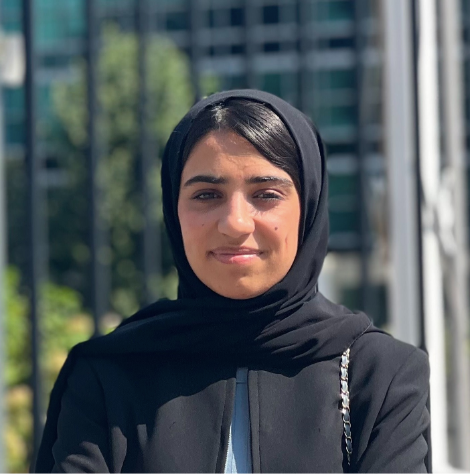On Sunday, January 14th, Dahlia Zemmel (Form V) hosted a Zoom meeting with Somaya Faraqi, former captain of the Afghan Dreamers, the Afghan all-girls robotics team. Faraqi is an engineer and activist who fights for girl’s education in Afghanistan. She was recognized in BBC’s 100 Women in 2020 as well as Forbes’ 30 Under 30 Asia in 2021. On Sunday evening, Fieldston students, parents and teachers gathered on Zoom to hear Faruqi’s story and ask her questions.
Somaya Faraqi grew up in Afghanistan and discovered her passion for mechanical engineering at a young age. Growing up, her father was a car mechanic and as the oldest child, she felt that it was her responsibility to help her father out. Once a week, she went to the shop and helped fix car parts. Although she wanted to be more involved in the shop, she could only work in the shop on Fridays because women couldn’t work in the shop with men. It wasn’t until she had the opportunity to join the all-girls Afghan robotics team in 2017 at age 14 that she could further pursue her interest in engineering.
The robotics team she joined was not only the first all-girls Afghan team, but also the first robotics team ever in Afghanistan. Being composed of only girls, the team dealt with lots of negative comments from other people and on social media. But that was not the last of their hardships. In 2017, the six-person team traveled to Washington D.C. to compete in the FIRST Global Competition. Upon traveling to the US, the team’s visas were rejected two times; finally, they were permitted to come to the US for a week, not on a visa. Also due to a shipping delay, the team only had two weeks, as opposed to three months, to build their robot. There was also a language barrier, which made it hard to communicate with other teams and their alliance in the competition. Despite these setbacks, the Afghan Dreamers left the competition with a silver medal, out of 157 participating countries.
After the competition, suddenly, the perspective people held about girls in Afghanistan changed. Many young women wanted to join the team and girls who didn’t have the opportunity to join the team did after the competition. Faruqi explained that while she was privileged to have parents who supported her, many girls didn’t have their parents’ support to join the team. However, after people saw the team’s achievements and increased support, many parents became more supportive. Since the competition, the sixperson all-girls team has expanded to 250 girls and has competed all around the world.
During the Covid-19 pandemic, the governor of Herat, Afghanistan asked the team to build a robot to help the city. The team developed a ventilator made of used Toyota and Honda car parts and a robot that sanitizes spaces such as hospitals, offices and surgery rooms. When asked what project she is most proud of, Faruqi cited, without hesitation, the development of the ventilator, as, at the beginning of 2020, the entire country was in quarantine and was in need of more ventilators. Working on this project was difficult because all the streets were blocked and, due to Taliban restrictions, Faruqi’s dad had to pick up the team from their homes and drive them to the workshop. Yet, the team took on this challenge because they felt it was important for their community and the world.
Besides being a mechanical engineer and a student, Faruqi is an activist. She, along with her team, works to fight for women’s rights, specifically girl’s right to education in Afghanistan. In 2021, the Taliban returned to power. Under their rule, girls cannot attend school, leave the house without men or work. Due to the changed situation, it became too hard to be a woman in Afghanistan. Many families left, including many members of the Afghan Dreamers, who now live all over the world and meet monthly on Zoom. Faruqi’s family left Afghanistan and now lives in California.
In 2022, Faruqi spoke at the United Nations Transforming Education Summit, where she voiced that women should have the same opportunities, rights and respect as their male counterparts. Faruqi continues to advocate for girl’s education globally. She is a Global Champion of the global fund Education Cannot Wait and is a part of ECW’s #afghangirlsvoices campaign which spreads testimonies of young Afghan girls on social media, the news and postcards.
The message Faruqi wants to spread is that women in Afghanistan have the potential and power but just need the opportunity. She also encourages more girls to pursue engineering. Even in her mechanical engineering class at university, there are only two girls. Faruqi also wants to spread the notion that although only war is shown in the news, Afghanistan isn’t just a place of war. She adds that there is also a big misconception about women in Afghanistan: before August 2021, women worked in all kinds of fields, played on sports teams and were viewed as equals.
The Zoom meeting ended with Faruqi informing us what we can do to support women in Afghanistan today. She said, “The only thing we can do is raise awareness about what is going on and the current women’s rights situation in the country.” She advised us to inform friends and family of the situation and advocate on social media because it may reach someone who can really help.









